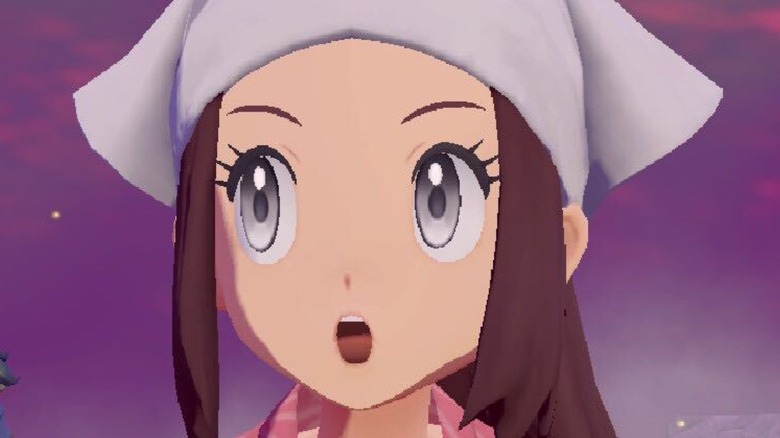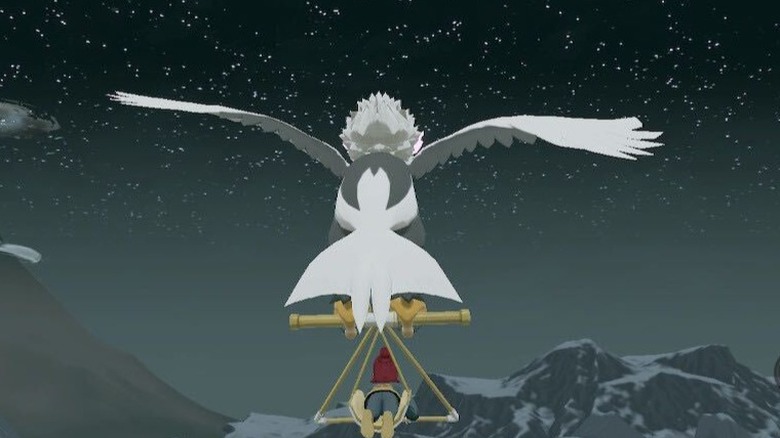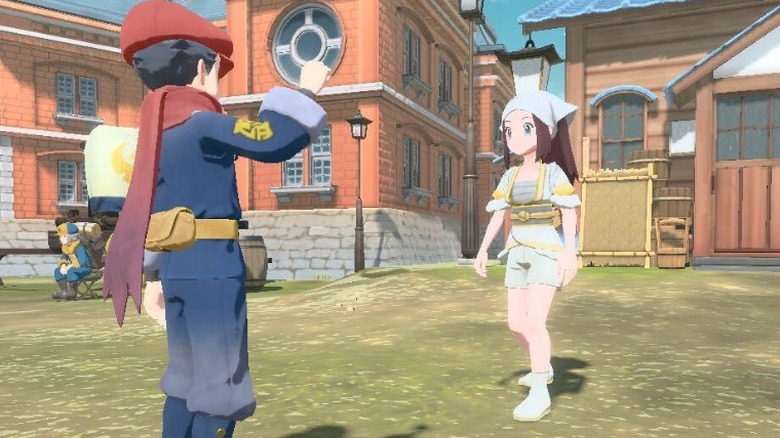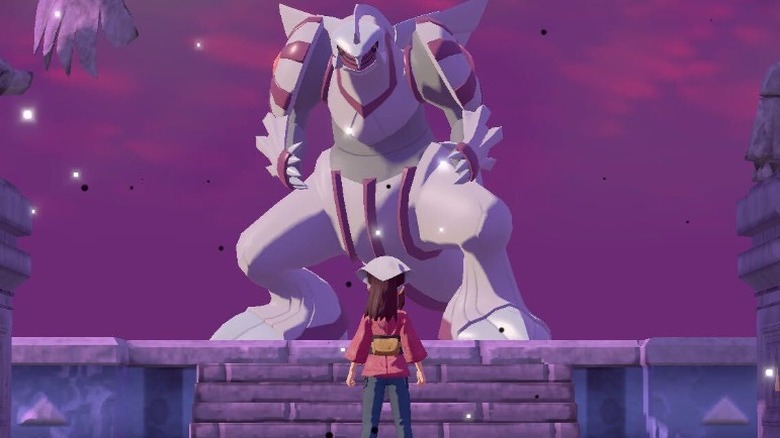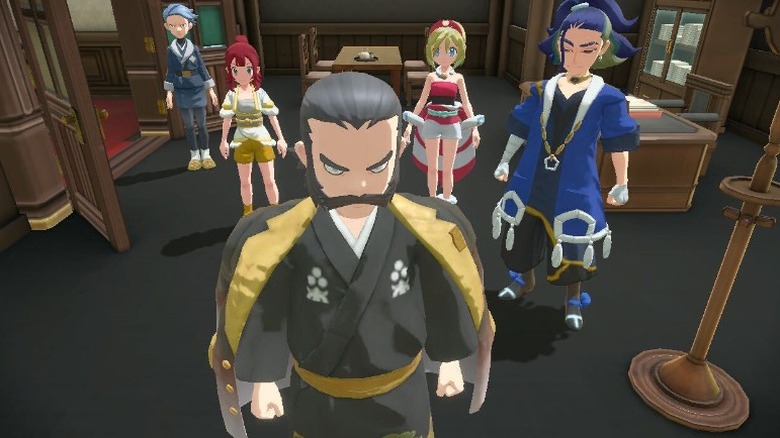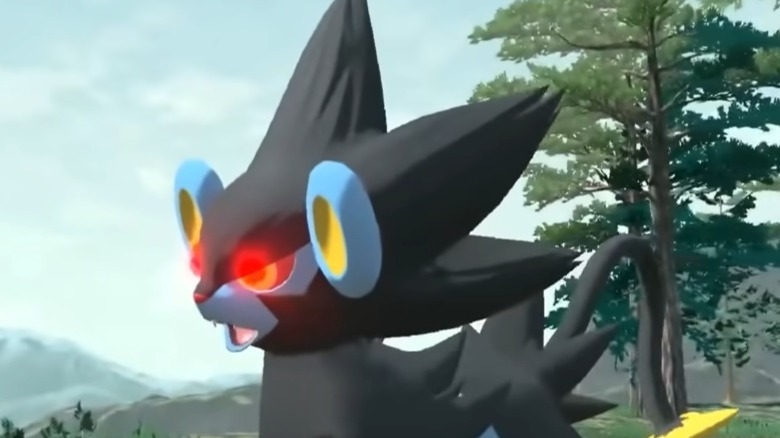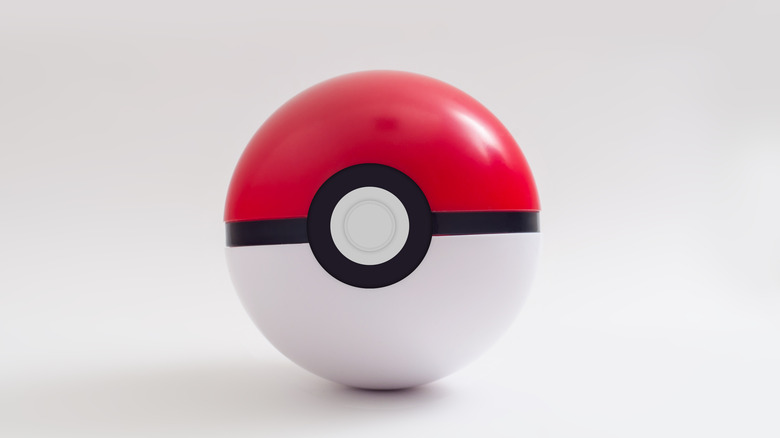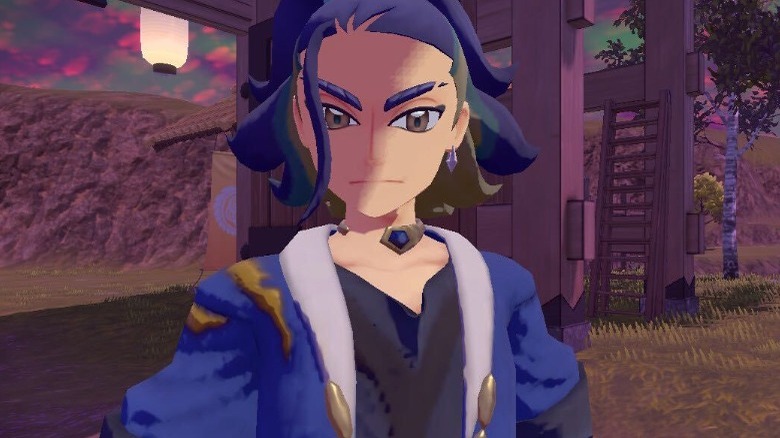Things Only Adults Notice In Pokemon Legends: Arceus
"Pokemon Legends: Arceus" was everything many adult "Pokemon" fans wanted and more. No one expected the series to take the turn that it did, but after the game was announced, many speculated that "Arceus" would change the series forever. When the game was finally released, critics praised it and players were blown away.
Older fans would come to realize that several Pokemon were missing, including some iconic 'mons from Generation One and Generation Two, but it didn't feel bad considering the new things added. For example, the more complex battling system that introduced strong and agile moves was something many long-time fans had been complaining about for years.
The "Pokemon" series has always been targeted at a younger audience, and "Pokemon Legends: Arceus" was the first to introduce more adult themes that could easily pass over the heads of younger gamers. Between the psychology behind some of the characters in-game and even the world and story in general, there were plenty of things that only adults would have noticed in "Arceus."
This article contains spoilers for the story content in "Pokemon Legends: Arceus."
The fear of the unknown (and no, not the Pokemon Unknown)
In the mainline "Pokemon" games, people and Pokemon live side-by-side. In fact, hardcore fans probably remember every previous Pokemon professor telling them about the harmonious relationship between Pokemon and humans. There was never too much discussion about a time before people and Pokemon were close companions, and that's the exact thing that "Pokemon Legends: Arceus" wanted to show.
At the beginning of the game, the player falls into the Hisui region, which is the Sinnoh region of the distant past. While a few people in the area have Pokemon of their own, the majority of people are scared of Pokemon. In fact, several side quests task the player with getting an NPC a Pokemon to look at (just for them to still be terrified of, like the Starly quest).
However, as the player expands their Pokedex and slowly introduces Pokemon to the village, the townspeople are much more receptive to the creatures. In fact, Pokemon come to live alongside villagers and even help out around town.
This slow progression of people accepting Pokemon gets to the heart of one of the game's major themes: the fear of the unknown. Many quests will ask you to fill out the Pokedex of a specific Pokemon for an NPC, and when the player satisfies the NPC's curiosity, they seem more willing to open up to Pokemon. These quests, and the story progression, show growth and a human side to the NPCs in "Arceus."
Finally, a complex rival
All of the previous "Pokemon" games have some version of a rival in them. The rival exists to basically travel around the "Pokemon" region with the player while also consistently checking the player's progress with battles that are sometimes more difficult than the regular gym battles. "Pokemon Legends: Arceus" flipped the rival idea on its head, and Akari/Rei, the rivals in the game, have more complex personalities than ever before.
One theme that runs throughout the game is the idea that Pokemon are dangerous, and people can lose their life if they're not careful. Because of this, the rival is extremely concerned about the player's safety when the player isn't allowed to stay in the town. Throughout the game, the rival is constantly worried about keeping the player safe from the frenzied Pokemon. Rei/Akari also has other details to their character, such as their slight ditziness.
This is the first time a rival in a "Pokemon" game has been emotionally complex. Previously, the only other rival to show any complex emotion was Hop in "Pokemon Sword" and "Shield," but even then it was self-centered as he struggled with his strength against another rival, Bede.
The dangerous side of the Pokemon journey
"Pokemon Legends: Arceus" doesn't shy away from danger. In fact, it embraces it like no other "Pokemon" game has before. At times, the player is forced to dodge Pokemon attacks, and even a promotional video released before the game turned heads for its creepy found-footage aesthetic. Additionally, that theme of death is lingering over a lot of what drives the game. Even Commander Kamado is only as zealous as he is because of his town being ransacked by a rampaging Pokemon previously.
In fact, even the player is aged up in "Pokemon Legends: Arceus." In almost every other "Pokemon" game, the playable character is 10 years old, which is the age that kids in the "Pokemon" universe can start on their journey to become a Pokemon Champion. There are a few exceptions, with "Pokemon Sun" and "Moon" having players start at 11 and "Pokemon Sword" and "Shield" having no given age.
However, "Pokemon Legends: Arceus" makes the player 15 years old — a pretty big jump in maturity from 10. This could be because the dangerous side of Pokemon is on full display. Even the Pokemon evolutions look more sinister than ever before. It could've been a bit odd to talk about the life and death of a child, but 15 years old is a bit more acceptable.
Politics in Pokemon
While many "Pokemon" games focus on some political themes, such as gaining power via Pokemon, conversation about the world's issues is left out. Besides that, there's very little discussion about politics throughout the games. "Pokemon Legends: Arceus" broke that trend, especially towards the end of the main story.
When the player is being falsely accused of causing Pokemon to become frenzied by Commander Kamado, Irida and Adaman become pretty upset. Irida in particular argues that it's impossible "to prove the absence of guilt."
This wording might sound foreign, but the concept is pretty similar – in many countries, including the United States of America, the idea behind the judicial system is that people are innocent until proven guilty. When "Pokemon Legends: Arceus" asks the player to prove themselves guilt-free, it's almost like a nod to just how difficult that task can be in real life and why many political systems are set up to avoid this very problem.
Power isn't always everything
In prior "Pokemon" titles, proving your power in a Pokemon battle pretty much earns the player the right to do whatever they need to. Stopping a crazy fanatic enemy who wants to see the world burn? A Pokemon battle should do. While "Pokemon Legends: Arceus" does also incorporate this idea in certain areas, it goes a bit deeper.
There are a handful of battles in "Pokemon Legends: Arceus" that the player has to take part in to progress the story. These include battling wardens who watch over Noble Pokemon in order to prove the player is capable of saving them from the frenzy. Some of the wardens, like Lian, are pretty trusting of the player and help the player complete their task. After being defeated, Lian is willing to help the player even throughout the rest of the storyline. Others, like Melli, will continue to fight the player in various ways after being defeated in battle (multiple times) up until the very end, trying to get in the way at every turn. It's clear that to some in the game, pure power isn't the end-all-be-all, a refreshing concept for the "Pokemon" games.
Respecting Pokemon versus owning Pokemon
Players have to facilitate peace between the Diamond and Pearl Clans. Some of the first encounters the players have with Adaman and Irida focus on what using Poke Balls means. Irida mentions that Pokemon are meant to "live freely," and that humans should "stand alongside Pokemon, not count [themselves] above them." Kamado shoots back with the idea that Poke Balls aren't being used out of "a desire to control," but rather used so that people and Pokemon can easily live alongside each other.
This argument from Irida posed an interesting question: are Poke Balls really all that ethical? In a game that explores the darker side of the "Pokemon" series, "Pokemon Legends: Arceus" doesn't necessarily answer this interesting question. While the Clans and the Galaxy Team come together by the end of the story, the morality of Poke Balls is never addressed again. This hanging thread could cause some adults to question which way is better — the Clans' or the Galaxy Team's.
Because the game doesn't really give players an answer (and because of the sense of betrayal Kamado leaves players with), it's a bit unnerving to remember that the history of the "Pokemon" universe went with Kamado's idea.
Ethnocentricism and opening up the mind
The player sees the two leaders of the Diamond and Pearl Clans, Adaman and Irida, arguing before even meeting them. They disagree with what the "almighty Sinnoh" essentially controls, time or space. This causes them to have a hard time cooperating with each other despite the urgency of the dangerous frenzied Pokemon in the region.
By the end of the game, they've worked together enough to admit that the two Clans aren't all that different. In fact, they even celebrate together. Additionally, both of the Clan leaders had their minds opened to the fact that the other Clan was right in their thinking — there were just two "almighty Sinnoh," Dialga and Palkia.
Not only was this a good model of two groups of people opening up their minds to new ideas, but it also showed that multiple groups can be right at the same time without anyone even knowing.

